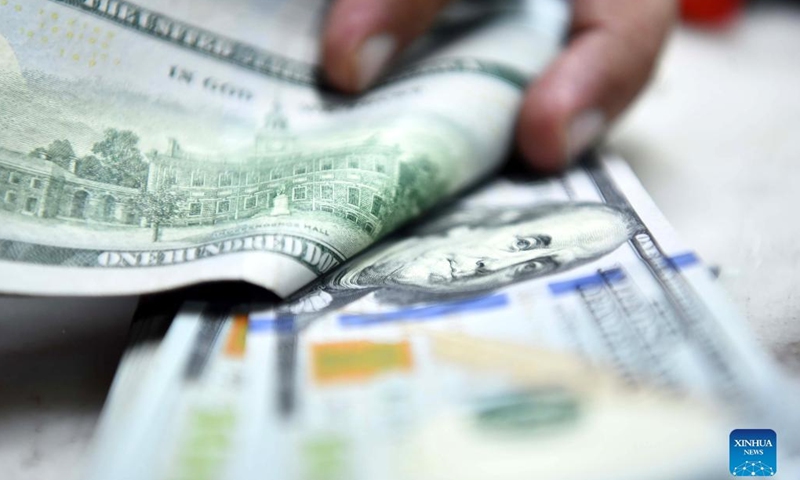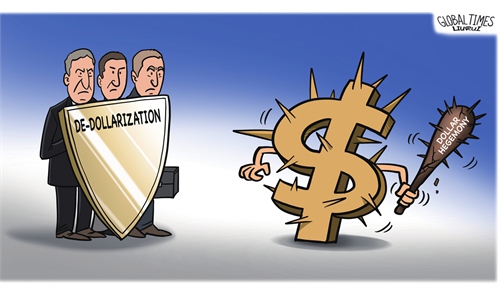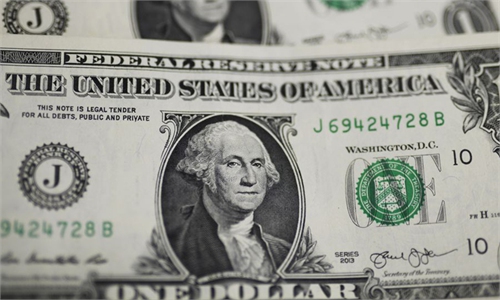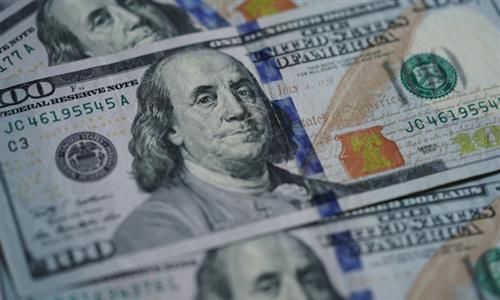
A currency changer counts U.S. dollar notes in Rawalpindi, Pakistan, on July 29, 2022. Pakistani rupee rebounded in the last trading session of the week on Friday, recording minor gains against the U.S. dollar after extending losses for 10 consecutive sessions in the interbank market, according to the State Bank of Pakistan (SBP). Photo: Xinhua
US dollar appreciation has harder negative spillovers on emerging markets through both financial and trade channels than on advanced economies, read a report released by the IMF on Wednesday.
The IMF said that a 10 percent appreciation of the US dollar would decrease the GDP of emerging market economies by 1.9 percent after one year, and the negative effect only dissipates after two and a half years.
The negative effects on advanced economies are considerably smaller and short-lived, with the drop in output peaking at 0.6 percent after one quarter.
Many emerging market economies also suffered a credit crunch, diminished capital inflows, and bigger stock market volatilities, the IMF said.
The report showed that dollar appreciation this year has had a noticeable impact on global economic growth, reflected in global current account balances, a key metric to calculate the sum of absolute current account balances across countries.
"The US dollar's rise has had an impact on all economies around the world, especially on countries with a single economic structure," Dong Shaopeng, a senior research fellow at the Chongyang Institute for Financial Studies at the Renmin University of China, told the Global Times on Thursday.
The main reason for the US dollar's appreciation is to draw foreign capital into the US to support its own economy, Dong noted.
"A few years ago, the US drastically cut interest rates and now, it has raised interest rates many times. Erratic US monetary policy has had a destructive impact on global financial markets," Dong said.
Argentina's President Alberto Fernandez warned against a sharp devaluation of the country's currency during an interview on Tuesday with Bloomberg TV's Maria Tadeo in Brussels, where he was attending a summit of leaders from Latin America and Europe.
The Argentine peso has suffered amid the South American nation's broader economic woes, with the official exchange rate sitting above 268 pesos per dollar as of Thursday and many local economists projecting that it will weaken to 400 by the end of this year.
It has lost 34 percent of its value against the dollar so far this year, making it the worst-performing currency in emerging markets.
Wang Wenbin, a spokesperson of China's Foreign Ministry, said on June 8 that the US is the world's largest economy and the issuer of a major international currency. Hence, the heavy spillover effect of its fiscal conditions and policy choices on the world economy and the importance for the US to adopt responsible fiscal and monetary policies.
However, the US has long used dollar hegemony, borrowed recklessly, shifted crises and pursued unlimited quantitative easing. This has spread US inflation to other parts of the world, made debt problems and economic woes in emerging market economies and developing countries worse and seriously held back the global recovery, Wang noted.
"We urge the US to opt for responsible fiscal and monetary policies, and work with other economies to enhance macroeconomic policy coordination, jointly safeguard international economic and financial stability, and contribute to the global recovery," Wang said.
De-dollarization is accelerating, and although the process may be slow, some countries have begun to try to hedge the risks posed by the dollar with currency swaps, according to Dong.



